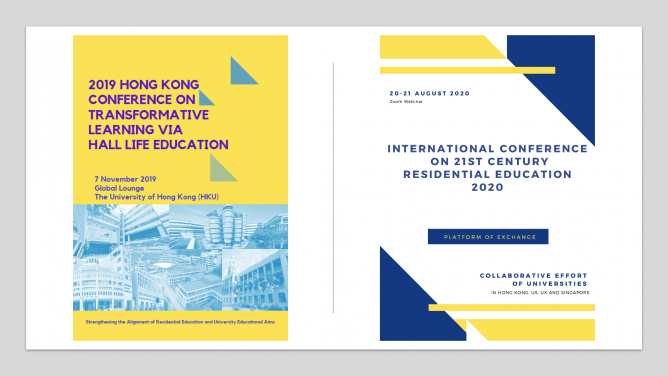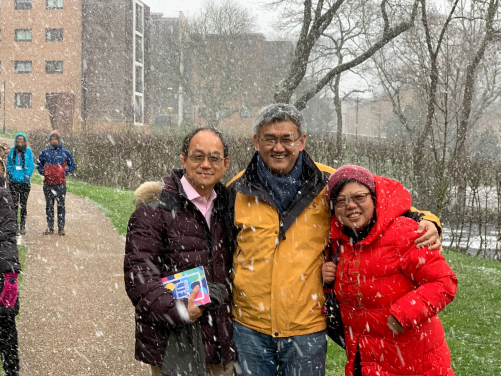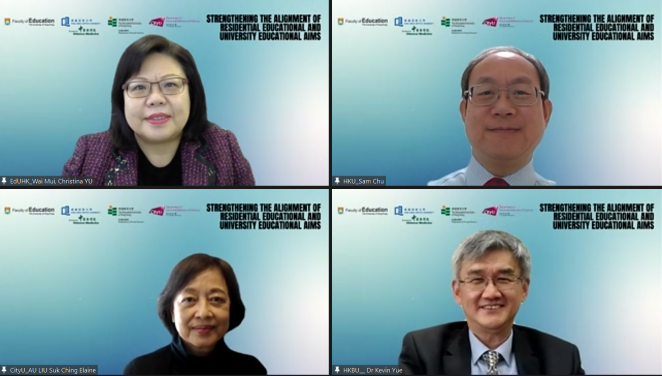Media
Research finds residential experience beneficial to students’ whole person development
29 Jan 2021

The project team has previously organised a conference at the University of Hong Kong, and an international webinar on residential education in 2019 and 2020 respectively.

The research team consists of Dr Samuel Chu, Associate Professor, Academic Unit of Teacher Education and Learning Leadership, Faculty of Education, University of Hong Kong (left), Dr Kevin Yue, Associate Director and Associate Professor, Teaching and Research Division, School of Chinese Medicine, Hong Kong Baptist University (middle), Professor Christina Yu, Professor (Practice), Social Sciences Department, Education University of Hong Kong (right), and Dr Elaine Au Liu, Associate Professor, Department of Social and Behavioural Sciences, City University of Hong Kong. They have organised numerous study tours for hall residents and hall education personnel to visit multiple top universities in the world.
- 1 / 3
- 2 / 3
- 3 / 3
Residential life is a crucial part of university education. However, the alignment of residential educational aims and university educational aims, particularly in the context of Hong Kong, remained unclear for decades. In light of this knowledge gap, a research team comprising members from The University of Hong Kong (HKU), Education University of Hong Kong (EdUHK), City University of Hong Kong (CityU) and Hong Kong Baptist University (HKBU) conducted a research project called “Strengthening the Alignment of Residential Education and University Educational Aims”, the first in Hong Kong on the aims of university residential education. The research reveals that residential experience has positive impact on students’ academic, social, and individual development, confirming that residential experience is beneficial to students’ whole person development.
The research team is led by Dr Samuel Chu, Associate Professor, Academic Unit of Teacher Education and Learning Leadership, Faculty of Education, HKU, and joined by Professor Christina Yu, Professor (Practice), Social Sciences Department, EdUHK, Dr Elaine Au Liu, Associate Professor, Department of Social and Behavioural Sciences, CityU and Dr Kevin Yue, Associate Director and Associate Professor, Teaching and Research Division, School of Chinese Medicine, HKBU as co-investigators. The project is funded by the University Grants Committee, and its findings were announced in the press conference held today (January 29).
This research used mixed methods, namely quantitative (online self-report questionnaire) and qualitative (focus group interview) approaches to find out how to strengthen the alignment of residential education and university educational aims of local universities. This is to help students acquire various non-cognitive skills, include self-control and social skills. This study started in 2017 with a duration of over three years. On average, around 1,700 students and alumni from the four above mentioned universities participated in the study each year. In terms of the cultural background, 70% of the participants were local and the remaining 30% came from Mainland China and overseas. All participants must have residential experience for at least one semester.
Main findings
The research reveals that residential experience had positive impact on the participants’ academic, social, and individual development. More specifically:
- The survey revealed that the most substantial impacts on Junior students (Year 1 and 2) were on academic performance, cultural exchanges, and social/global awareness and empathy.
- In terms of the senior students (Year 6 or above: participants who are/were enrolled in 6-year undergraduate programmes or any postgraduate programmes), the most substantial impacts were seen in time management, peer-group interaction and communication skills, planning and problem-solving skills, and self-efficacy.
- Positive impacts in open-mindedness and self-control were also brought about by residential experience, yet there were not significant differences across different student groups.
- Participants from all four local universities agreed that residential life could help them become more independent and confident, improve their communication skills, and cultivate their problem-solving skills.
- More than 80% of the participants considered the aims of residential education aligned with the educational aims of their universities. This proves that residential education can effectively help universities cultivate students’ skills in various aspects.
- The participants also thought that the enhancement of problem-solving skills was a key element of residential education, which aligns with the university educational aims. As such, they could complement each other and fully encourage students’ development.
- Through focus-group interviews, the research found that the alignment of residential educational and university educational aims also depended on the unique campus culture of each university. For example, participants from EdUHK had relatively clearer career paths than participants from the other universities, as they aimed at the positions in the education sector. Hence, their needs for enhancing career planning through residential education were less obvious.
Dr Samuel Chu, the Project Leader, concluded: “The research shed light on the synergy between residential education and university education in terms of facilitating students’ holistic development. It also raised the importance of aligning the educational aims inside and outside the residential hall context. We hope this research can help Hong Kong universities develop comprehensive residential education programmes to help students not only excel academically, but also build soft skills beyond classrooms and laboratories.”
The research team provided several suggestions based on the findings. These include increasing human resources and appropriating more funds for residential education development, strengthening the training of personnel in the residential education field, and organising more hall activities that reflect the universities’ campus cultures and residential educational aims. It is hoped that through these measures, students’ perceived value of residential education could be enhanced, which in turn will help them achieve residential and university educational aims.
To promote knowledge exchange on residential education, the research team also organised several overseas trips to visit top universities in the USA, UK, and Singapore, such as Harvard University, The University of Cambridge, and Nanyang Technological University. Participants consisted of student residents, wardens, resident tutors, and hall affair officers from the four local universities. The trips facilitated the participants’ learning good practices from the visited universities and the reflection on the visions and systems of residential education in local universities. The trips also inspired the student residents to acquire non-formal learning and self-learning through their residential life.
To download related photos, presentation file and further reference materials, please visit http://web.edu.hku.hk/press.
For media enquiries, please contact Ms Emily Cheung, Senior Manager (Development and Communications), Faculty of Education, HKU (Tel: 3917 4270 / Email: emchy@hku.hk), or Dr Elsie Ong, Manager of the “Strengthening the Alignment of Residential Education and University Educational Aims” Project (Tel: 3917 4314 / Email: elsieong@hku.hk).

